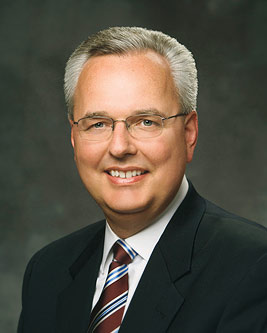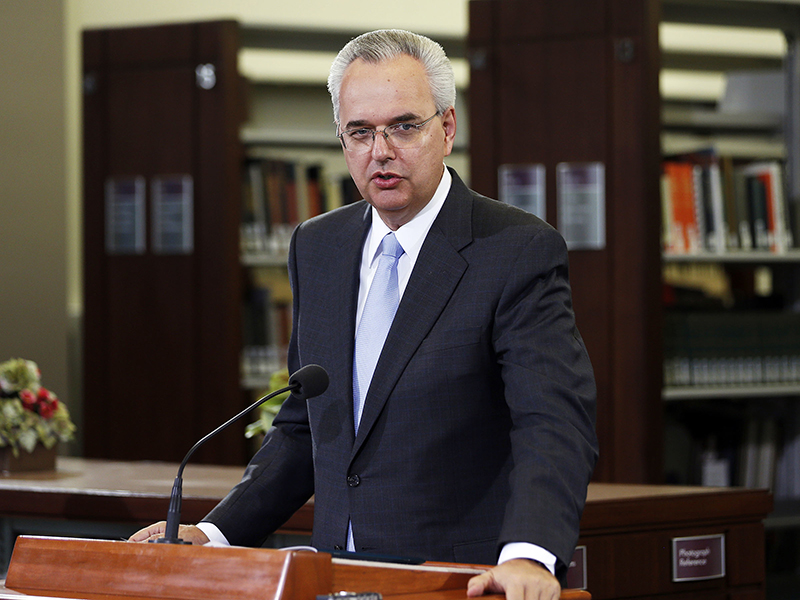(RNS) — In a surprise announcement, The Church of Jesus Christ of Latter-day Saints revealed Tuesday (Aug. 8) that James J. Hamula of the First Quorum of the Seventy was released from his calling as a general authority and also excommunicated from the Church.
It is the first time a top LDS leader has been excommunicated in nearly three decades.
Here’s the preliminary coverage from The Salt Lake Tribune, which states: “LDS Church spokesman Eric Hawkins provided no details about the removal. But the church did confirm Hamula was no longer a member of the church and that his ouster was not for apostasy.”
The Deseret News has its coverage here and promises updates as the story develops.
One thing I doubt we’ll see, though, are significant details about what happened and why Elder Hamula has been removed. Or at least, we won’t get those answers from the Church itself, which (as the DN article makes a point of noting) maintains a strict standard of confidentiality where excommunications are concerned.
RELATED: Mormon church leader excommunicated for 1st time in decades
I can see both sides to the Church’s long-standing radio silence where excommunication is concerned. On the one hand, confidentiality can protect excommunicants and their families from unwanted and unhelpful judgment. It leaves the door open for a potential rebaptism and restoration of blessings.

Elder James J. Hamula, formerly of the Seventy. Credit: LDS Church
At least in theory. You can also argue that gossip thrives in the absence of real information. I have heard of cases, for example, where a church member has been excommunicated for apostasy or lack of belief but has then been excoriated in the Mormon Rumor Mill for a host of other fabricated reasons, from “I heard she had an affair!” to “I don’t think he’s paid his tithing in years.”
Mormons used to excommunicate people more publicly, more transparently. In the 19th century, Joseph Smith openly chastised fellow church leaders and some were excommunicated, including top names like William McLellin, Orson Pratt, Thomas Marsh and many others.
In the 20th, excommunications of leaders were far more rare, but there were some major ones, especially when Apostle Richard R. Lyman was excommunicated in 1943 for what the Church described in a terse statement as a violation of the law of chastity. At the time, he was married to Amy Lyman, the general president of the Relief Society, but he was living with another woman in a relationship he may have viewed as polygamous but the Church viewed as adulterous.
And in 1989 — the most recent high-profile excommunication of an LDS general authority — George P. Lee was removed for “apostasy and other conduct unbecoming” a member of the Church. The New York Times’ coverage at that time referenced Lee’s unusually public criticisms of the LDS hierarchy. As the first Native American general authority, Lee had some harsh words for the way that fellow LDS leaders treated Native Americans as second-class citizens.
Five years later, Lee also pleaded guilty to the attempted sexual abuse of a minor — a neighbor girl he had molested from the time she was 9 years old, while he was serving as a general authority.
It’s not clear to me whether the Church knew about the sexual abuse at the time of Lee’s 1989 excommunication, or if that only came to light later when the girl’s family came forward with a criminal accusation. “Conduct unbecoming a member” can cover a whole multitude of sins. The possibility that the Church may have known but not made it public because of the confidentiality that has come to attend excommunications is deeply troubling to me, however.
Some things are private and deserve to remain private: loss of faith, for example. Some problems, however, have a community component and deserve to be made known, things like financial misdeeds, predatory sexual behavior or repeated lying to the community (as was the case with disciplined-but-apparently-not-excommunicated LDS leader Paul Dunn).
There’s a part of me that doesn’t want to know what caused the excommunication of Elder Hamula. And there’s another part of me that wishes the Church would be more transparent, particularly insofar as members are now asked to sustain all general authorities during a temple recommend interview. I put my trust in this person. What happened to betray that trust?
How much truth does a religion owe its people?
RELATED POSTS:
- An in-depth look at every individual ever excommunicated by Jesus Christ in scripture
- Mormon leaders have trust issues
- The dangers of idolizing Mormon prophets
Correction, or the “duh” files: An earlier version of this post stated that George P. Lee was an apostle, and he was a Seventy. Thank you to the reader who pointed out my mistake!






